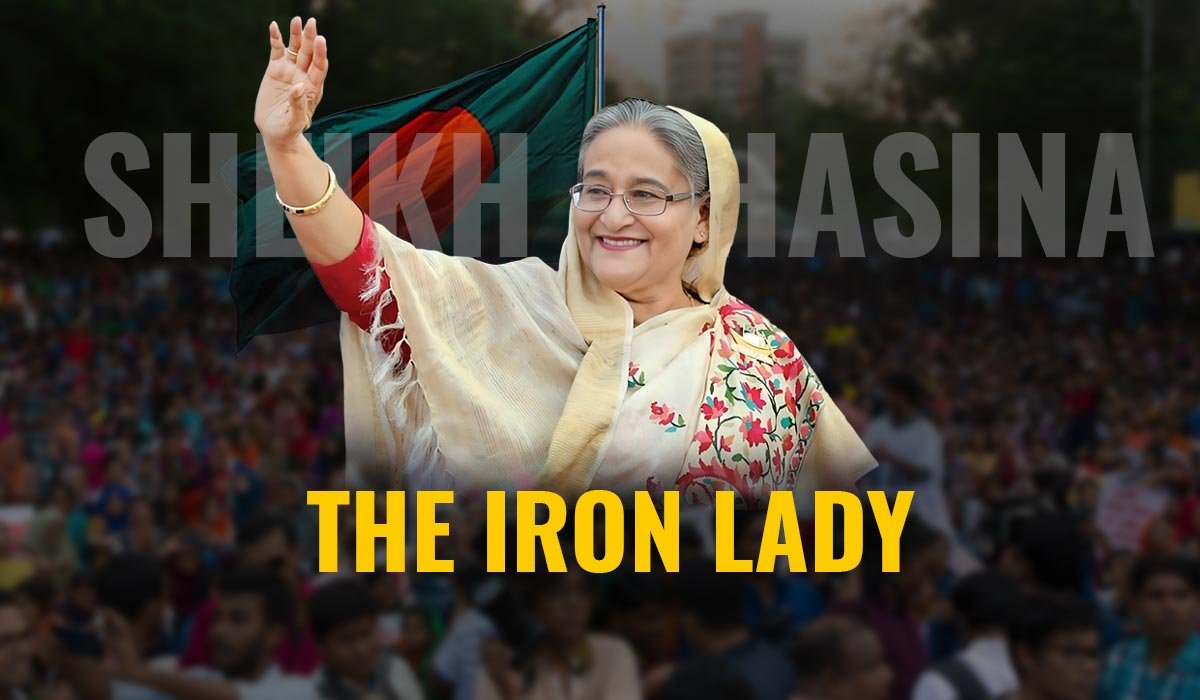Sheikh Hasina Wazed is currently the Prime Minister of Bangladesh. She has served as Asia’s “Iron Lady” since January 2009 and is well-known throughout the region. She has been involved in politics for almost 42 years and holds the record for the longest term of any female head of state in history.
Bonga Bondhu Sheikh Mujibur Rahman was the country’s founding father and first president. In 1975, he and the bulk of his family were slain. Hasina fled the country at the time and went into exile for the next six years.
After her return to Bangladesh in 1981, Hasina rose to popularity as an opposition leader. She was elected prime minister for the fourth times serving over 19 years 1996-2001 and 2009-preesent. According to Moni and Joy (2012), she is credited with furthering democracy and human rights as well as improving the quality of life for Bangladeshi residents.
Background and Political Career
Sheikh Hasina Wazed took over the chairmanship of the Awami League, the political organisation founded by her father, in 1981. She began her political career at this moment and went on to become one of the most influential and powerful personalities on the global stage.
From 1996 until 2001, when she was Bangladesh’s first Prime Minister, the country’s economy improved dramatically, yet poverty continued. Yet, under her leadership, poverty was one of the primary concern, with a GDP growth rate of around 7% yearly for a significant period of her reign, this led to her to become the elected prime minister once again in 2009, and still she is in power. She is seen as an outspoken advocate of democracy and human rights for Bangladeshis. Her presence is considered in regional politics, contributing to the advancement of peace and stability in South Asia. Sheikh Hasina has a difficult and divisive character, which makes her one of most prominent leaders in South Asia.
Additionally, The Houphouet-Boigny Peace Prize by UNESCO in 1998 was awarded to Sheikh Hasina arbitration in ending the Chittagong Hill Tracts War, which lasted 25 years, despite this act, many critique on her tougher restrictions on press freedom accusing her of using autocratic power over her detractors. On the other hand, Hasina has stressed Bangladesh’s exceptional economic achievements throughout her ten-year administration (International desk, 2023). Her tenure quadrupled Bangladesh’s GDP per capita, and the country saw unprecedented economic growth. Her aim to eradicate poverty, with the number of people living below the national poverty line having been reduced by more than half. She has also expanded access to healthcare and education, as well as made significant investments in infrastructure.
Rise and fall
Bangladesh has made tremendous progress in several areas including infrastructure, health and education. As a result, there is now more overall wealth and significantly less poverty. This is especially important considering that Bangladesh was one of the poorest countries in South Asia at the time of independence. Bangladesh has become a unique case in economic development due to its sustained GDP growth (outpacing neighboring Pakistan) and its status as one of the fastest growing economies in the world. Since 2000, the average annual GDP has increased by 6.8%. The share of people living in poverty has decreased from 43% in 1991 to 20% in 2023. Bangladesh has achieved universal completion of primary education and is on track to achieve universal completion of secondary education by 2030. The country has also made significant progress in improving maternal conditions. Health and reduction of child mortality.
Although Bangladesh has had rapid economic progress in recent years, its political development has been more difficult. Particularly in the aftermath of the legislative elections in December 2018, the country has come under increasing pressure to abandon its commitment to democracy, the rule of law, and human rights. The country’s political institutions are being reviewed since concerns have been made about the impartiality and transparency of the voting process. The parliamentary elections in December 2018 were characterised by allegations of vote rigging and intimidation. According to reports the Election Commission was accused of being biassed in favour of the incumbent party (The Economist, 2023).
Despite having inadequate economic and political governance systems, Bangladesh has made substantial progress in terms of social development indicators. However, achieving targeted health outcomes in Bangladesh is significantly dependent on governance challenges. The government aspires to achieve a “Digital Bangladesh” by 2021, however there are impediments in the way of that objective being realised. Bangladesh’s local government system has achieved minimal development in terms of efficiency, power decentralisation, democratic practises, and public participation. Despite these hurdles, Bangladesh’s prime minister, Sheikh Hasina, has remained committed to promoting macroeconomic stability and investing in human capital, which has shown positive outcomes and improved Bangladesh’s overall economic trajectory. Furthermore, Bangladesh has taken a stand on the international stage by advocating for the achievement of the Sustainable Development Goals (SDGs), with a focus on climate change adaptation and mitigation, effective use of water resources, aid efficacy, and female education promotion (Tribune Report, 2023).
Transformation of the Country
Bangladesh has seen significant improvements in a variety of sectors under the leadership of Sheikh Hasina. These changes include:
- Poverty reduction: Under Sheikh Hasina’s leadership, poverty reduction has been given great importance, and as a result, Bangladesh’s poverty rate has dramatically decreased. According to World Bank figures, poverty in Bangladesh declined from 31.5% in 2010 to 24.3% in 2016. To that end, the government has implemented a variety of policies, including job creation, microfinance, and social safety nets.
- Economic progress: Under Sheikh Hasina’s administration, Bangladesh has achieved significant economic progress. Over the last 10 years, the nation’s GDP has expanded by an average of 6% every year. Some of the factors that have contributed to this surge include the expansion of the garment industry, the construction of infrastructure, and the expansion of the services industry.
- Improved living conditions: Sheikh Hasina’s administration has emphasised enhancing the standard of life for all inhabitants. Healthcare, education, and housing have all benefited from investment. For example, the government’s Ashrayan initiative proposes for the creation of over 4 million low-income housing units.
- International recognition: Sheikh Hasina’s leadership has received worldwide acclaim. She was awarded the prestigious Gandhi Peace Prize in 2020 for her advocacy of nonviolence and other Gandhian methods to social, economic, and political development.
Finally, during Sheikh Hasina’s leadership, Bangladesh has experienced tremendous improvements, including a decrease in poverty, economic progress, a rise in living standards, and global recognition. She is a powerful leader because of her unwavering devotion to the progress of her country and her dogged support for LDCs on the world stage.
Why People Should Choose Her to Continue to Lead Bangladesh
Sheikh Hasina is renowned around the world for her diplomatic and leadership abilities. she spoke out against terrorism, militancy, and extremism while working to secure free and fair elections. She has drawn criticism, nevertheless, for the way her government has handled corruption, violations of human rights, and persecution of religious minorities. A risky political culture has developed as a result of the prime minister’s consolidation of power, which has caused democratic institutions to deteriorate. Despite this, Sheikh Hasina is seen as a role model for women and is given credit for turning Bangladesh into a prosperous nation. Her prompt response in times of need, such as the effective evacuation of Bangladeshi nationals from China and the closing of schools during the epidemic, revealed her dedication to the welfare of her people. Although her leadership is appreciated, there are issues with the absence of parliamentary opposition and accountability systems. Sheikh Hasina’s administration has been a mixed bag overall, with her administration doing well in certain sectors and doing poorly in others.
Absence of Her Leadership or Return of BNP Jammat e Islam to Power
Persecution of religious minorities and violations of human rights have long been issues in Bangladesh. Minority communities in Bangladesh have experienced challenges for decades as a result of the state’s denial of their rights. The authorities’ exploitation of the law to achieve their immoral goals has stripped the targeted communities of their capacity to operate economically, politically, and culturally. Hindus, Buddhists, and Christians are the three main religious minorities in Bangladesh. Bangladesh has a distinct religious majority as well. Religious minorities are supposedly subjected to the severe persecution in Bangladesh, according to the National Human Rights Commission (NHRC). Positive strides have been made as a result of Sheikh Hasina’s zero-tolerance policy towards terrorism and violence against religious minorities. However, more has to be done to address the concerns of minority religious groups who claim that the government did not appropriately punish those who perpetrated violence against them. The administration has been urged to defend the rights of religious minorities and promote tolerance by the ambassador-at-large and ambassadorial representatives of the United States (Moni & Joy, 2012).
The topic at hand is the potential consequences of the BNP Jammat e Islam returning to power in the country. If this were to happen, there could be several negative outcomes. Firstly, there is a risk that religious minorities in the country could be marginalized or even persecuted. This is because the BNP Jammat e Islam has been accused of being anti-minority in the past. Secondly, the country could become a breeding ground for extremist groups, leading to an increase in terrorist attacks and other forms of violence. This could result in the region turning into a cocoon of terror, similar to what has happened in Afghanistan. Thirdly, poverty and homelessness could increase due to corruption and mismanagement, which the BNP Jammat e Islam has been accused of in the past. Fourthly, there is a risk that the country could become a hub for Islamic jihadhi, leading to an increase in terrorist attacks not only in the country but also in the region. Lastly, corruption could increase, leading to a decrease in foreign investment and economic growth in the country. It is important for the government to ensure that the democratic process is followed and that the will of the people is respected to prevent these negative consequences from occurring.
Addressing the Religious Minorities Issues
In Bangladesh, religious minorities experience severe violence and discrimination. Local human rights organisations, Christian, Hindu, and Buddhist societies, as well as cases of racial violence against religious minorities, have been documented. Religious minorities say that the government does not enough punish those who hurt them. Governments must step in to defend religious minority’ rights and secure their safety in order to get through these obstacles. A zero-tolerance policy against terrorism and violence against religious minorities has been put in place by Prime Minister Sheikh Hasina. Despite the fact that this policy is a positive beginning, more has to be done to address intolerance and violence against religious minorities. Religious minority in Bangladesh claim that Prime Minister Sheikh Hasina upholds their constitutional rights. The government should, however, take into account the worries of minority religious groups that those who perpetrate violent crimes against them would not get harsh enough punishment. Ambassador and US embassy representatives denounced religious violence and urged the government to uphold tolerance and the rights of religious minorities. Although Sheikh Hasina’s administration has made great strides in eradicating poverty, enhancing health and education, and building infrastructure, issues like violations of human rights, corruption, and the rise of religious minorities must persist if inclusive growth is to be achieved. Prosperity over the long future is certain. The administration of Sheikh Hasina should also assist in finding a moral solution to these problems.
References
Moni, D., & Joy, S. W. (2012) The Success Premier Sheikh Hasina. https://daughterofdemocracy.wordpress.com/2012/10/10/the-success-premier-sheikh-hasina/
Khondker, H. H. (2017). Sheikh Hasina of Bangladesh: Politics, personality and policies. Women presidents and prime ministers in post-transition democracies, 221-237.
Leth, S. (2020). Her Excellency Sheikh Hasina Honorable Prime Minister Sheik Hasina.
The Economist. (2023, May 24). Sheikh Hasina is Asia’s iron lady. The Economist. https://www.economist.com/asia/2023/05/24/sheikh-hasina-is-asias-iron-lady
International desk. (2023, May 25). Sheikh Hasina is Iron Lady of Asia – Who Leads the Country of 17 Crore People. Editorialge. https://editorialge.com/sheikh-hasina-iron-lady-of-asia/
Tribune Report. (2023, May 26). The Economist Terms PM Hasina “Asia’s Iron Lady.” Dhaka Tribune. https://www.dhakatribune.com/bangladesh/284471/the-economist-terms-pm-hasina-asia%E2%80%99s-iron-lady






